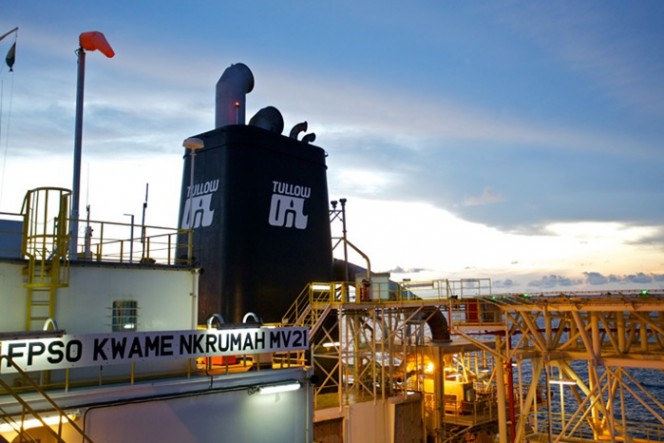Demand for Accountability Heightens as Ghana Marks 9 Years of Oil Production
 Accra, Ghana, March 11, 2019//-The demand for accountability in Ghana’s oil and gas industry has heightened as the country marks nine years of commercial production of oil from the Jubilee field of Cape Three Points in the Western Region.
Accra, Ghana, March 11, 2019//-The demand for accountability in Ghana’s oil and gas industry has heightened as the country marks nine years of commercial production of oil from the Jubilee field of Cape Three Points in the Western Region.
It is situated in the Deepwater Tano and West Cape Three Points blocks of the Tano Basin, which is one of the three offshore sedimentary basins in Ghana.
The field jointly owned by a consortium of companies called Jubilee Joint Venture and managed by Tullow Ghana Ltd, a subsidiary of UK-based Tullow Oil Plc. Other five members of the consortium were – Kosmos Energy, Anadarko Petroleum, Petro SA and the state-owned Ghana National Petroleum Corporation (GNPC).
The field which was discovered by the consortium in 2007, was named Jubilee field, because Ghana was celebrating its 50th anniversary at that time.
It was hoping to produce 55,000 barrels of oil per day (bopd), increasing to 120,000 bpd in six months. Tullow expects 2019 average gross oil production from the Jubilee field to increase to around 96,000 bopd.
President John Evans Atta Mills, of blessed memory who on that momentous 15th December, 2010, commissioned the Jubilee field which ushered Ghana into commercial oil production, was expected to earn more revenues for the development of the country.
Ghanaians undoubtedly welcomed the news, as it could enhance revenue generation and job creation, and significantly improve the national economy.
At the time of chalking this historic feat, Ghana did not have most of its laws in place to properly police the burgeoning oil and gas industry.
As a result of this, many people, including oil experts, economists and civil society actors to express concern that Ghana would be afflicted by the “resource curse” which faces resource endowment countries in Africa.
The “resource curse” often marked Africa’s oil and mining industries: decades of extraction that often saw only a few getting richer but the majority getting poorer, economic distortions caused by improperly managed resource wealth and hardly any money set aside for times when commodity prices dip or the wells dry up.
For Ghana, examples of such problems are very close to home. Nigeria, its West African neighbour and the continent’s largest oil producer saw successive governments deplete the estimated $400 billion earned from crude oil sales since the 1970s.
Moreover, Ghana’s own record in managing mineral revenues after a hundred years of gold mining is nothing to write home about.
After the Jubilee field, other fields such as the Tweneboa, Enyenra and Ntomme (TEN) and Sankofa-Gye Nyame are on stream, while exploration activities are underway in the Voltaian Basin.
Nine years into the production of oil and gas, the country is still grappling with the wanton embezzlement, misapplication and criminal abuse of oil and gas revenue meant for the provision of infrastructure and other social projects for the people. Most at time, the public officials and their conspirators who commit these crimes are left off the hook.
Reports by the Public Interest and Accountability Committee, (PIAC), established in September, 2011, and tasked with the oversight responsibility of monitoring and evaluating the management of Ghana’s petroleum resources by the government and relevant stakeholder institutions show these malpractices year.
Economist and Professor at the University of Cape Coast (UCC), John Gatsi, added: “Mismanagement, inappropriate disclosures, less accountability, corruption and nepotism are the drivers of the resource curse.
The successive PIAC reports and other reports about the national oil company, GNPC over the years mean some of the elements that may drive to resource curse are prevalent in the management of oil and gas in Ghana and this demands the efforts of all to ensure the right things are done”.
The management of oil and gas still needs improvements and collaboration and pressure for accountability is the key tool to ensure significant improvements, Prof Gatsi stressed.
Gideon Ofosu-Peasah, a Policy Analyst at Penplusbytes, a leading NGO in Ghana encouraged the government to open up to civil society and citizens “because they hold solutions to maximizing the nations natural resources”.
Again, the government should be passionate about getting the best out of international oil organisations (IOCs), he added.
The recent agreement entered between the Public Interest and Accountability Committee (PIAC) and the Economic and Organised Crime Office (EOCO) to probe the use of state revenue from oil and gas to prevent the widespread embezzlement, misapplication and criminal abuse, is in the right direction.
The EOCO investigations which are expected to begin from 2011, when the country started receiving petroleum revenue would ensure that all monies accrued to the State are accounted for.
Any person or an institution that is found to be culpable would be dealt with in accordance with the laws of the land.
Also, the country being a member of the global Extractive Industries Transparency Initiative (EITI), which is a global standard for improving transparency and accountability in the oil, gas and mining sectors, is a clear manifestation that it wants to be accountable in the management of the oil wealth.